S - Extend LLM with external actions
- Unify the protocol, and implement once
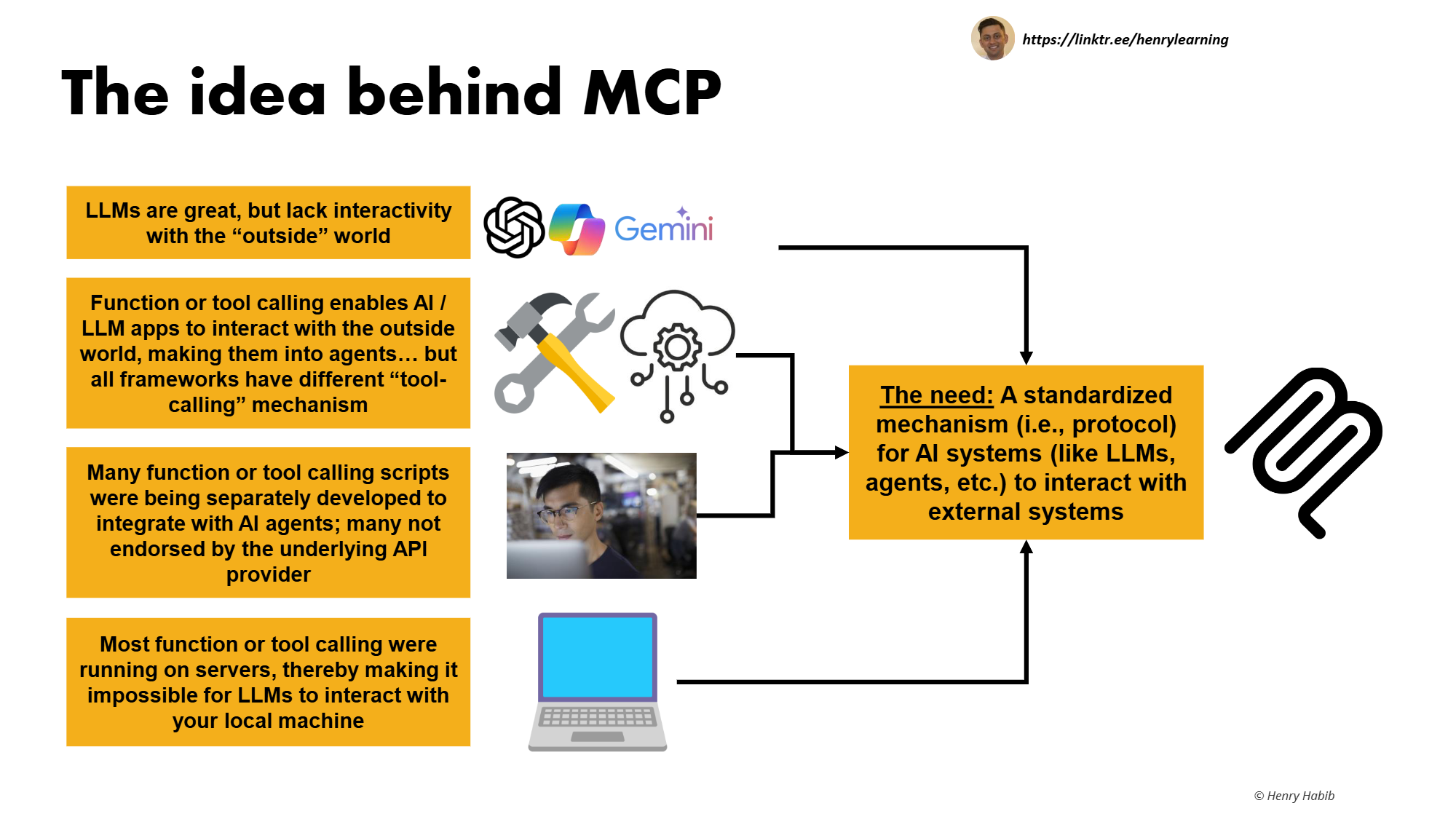
TA - Model Context Protocol
Arch overview
边界

类别

Arch

Flow

External Services
UPWARD: work as capabilities to server
- Local file
- Local desktop
- to screenshot your local computer to tell what you are seeing
- API call
- Another LLM
A - wrappered by server
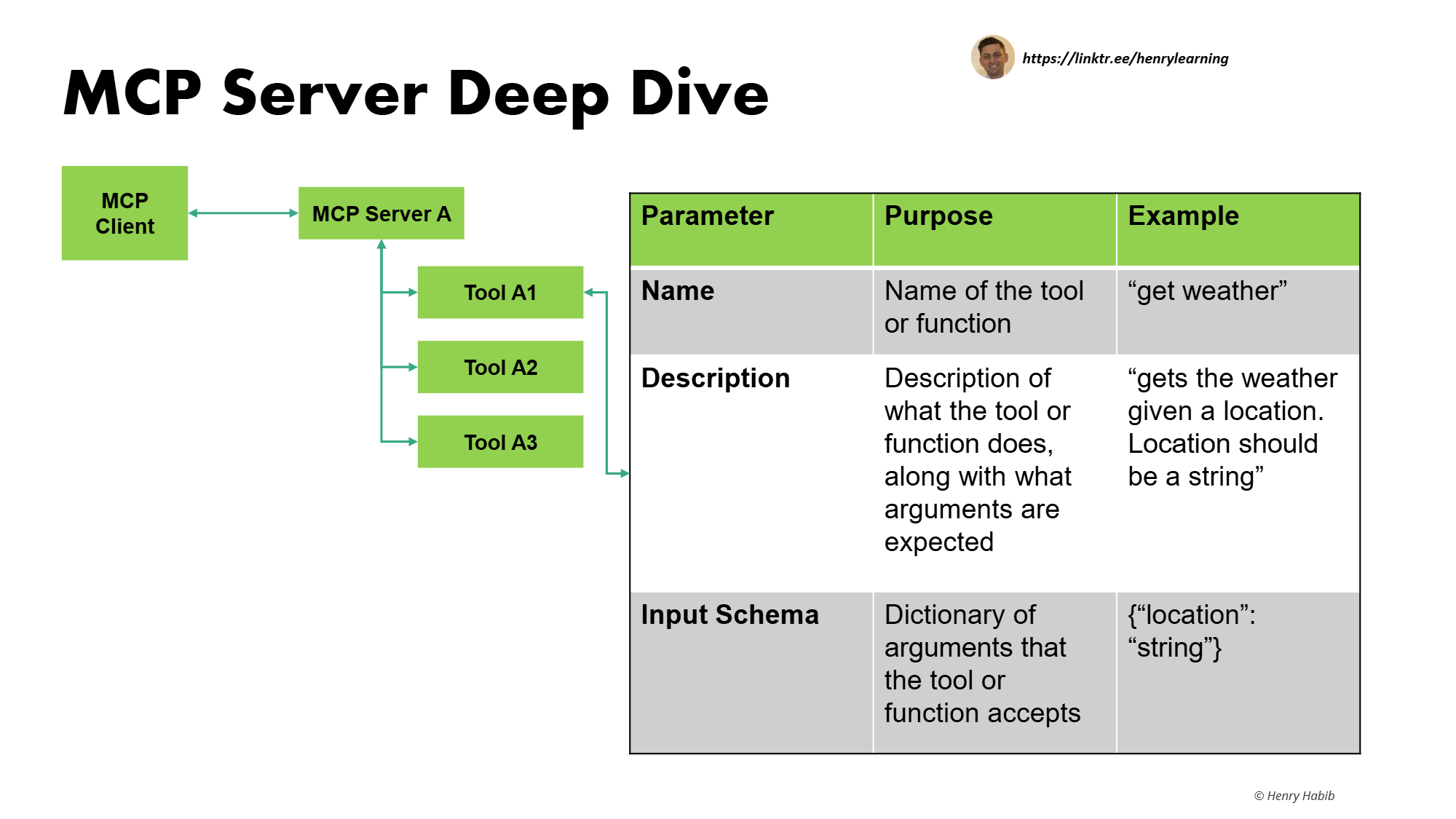
- Local file <- with open(file,“a/r”, encoding=“utf-8) as f: f.write(content)/notes = f.read()
from mcp.server.fastmcp import FastMCP
mcp = FastMCP("LocalNotes")
@mcp.tool()
def add_note_to_file(content: str) -> str:
"""
Appends the given content to the user's local notes.
Args:
content: The text content to append.
"""
filename = 'notes.txt'
try:
with open(filename, "a", encoding="utf-8") as f:
f.write(content + "\n")
return f"Content appended to {filename}."
except Exception as e:
return f"Error appending to file {filename}: {e}"
@mcp.tool()
def read_notes() -> str:
"""
Reads and returns the contents of the user's local notes.
"""
filename = 'notes.txt'
try:
with open(filename, "r", encoding="utf-8") as f:
notes = f.read()
return notes if notes else "No notes found."
except FileNotFoundError:
return "No notes file found."
except Exception as e:
return f"Error reading file {filename}: {e}"
if __name__ == "__main__":
mcp.run()
- Local desktop <- pyautogui.screenshot()
from mcp.server.fastmcp import FastMCP
from mcp.server.fastmcp.utilities.types import Image
import pyautogui
import io
# Create server
mcp = FastMCP("ScreenshotDemo")
@mcp.tool()
def capture_screenshot() -> Image:
"""
Capture the current screen and return the image. Use this tool whenever the user requests a screenshot of their activity.
"""
buffer = io.BytesIO()
# if the file exceeds ~1MB, it will be rejected by Claude
screenshot = pyautogui.screenshot()
screenshot.convert("RGB").save(buffer, format="JPEG", quality=60, optimize=True)
return Image(data=buffer.getvalue(), format="jpeg")
if __name__ == "__main__":
mcp.run()
- API call <- requests.get()
from mcp.server.fastmcp import FastMCP
import requests
mcp = FastMCP("Crypto")
@mcp.tool()
def get_cryptocurrency_price(crypto: str) -> str:
"""
Gets the price of a cryptocurrency.
Args:
crypto: symbol of the cryptocurrency (e.g., 'bitcoin', 'ethereum').
"""
try:
# Use CoinGecko API to fetch current price in USD
url = f"https://api.coingecko.com/api/v3/simple/price"
params = {"ids": crypto.lower(), "vs_currencies": "usd"}
response = requests.get(url, params=params, timeout=10)
response.raise_for_status()
data = response.json()
price = data.get(crypto.lower(), {}).get("usd")
if price is not None:
return f"The price of {crypto} is ${price} USD."
else:
return f"Price for {crypto} not found."
except Exception as e:
return f"Error fetching price for {crypto}: {e}"
if __name__ == "__main__":
mcp.run()
- Another model <- client.chat.completions.create()
from mcp.server.fastmcp import FastMCP
from openai import OpenAI
YOUR_API_KEY = 'xxx'
YOUR_API_KEY1 = 'xxx'
DS = "https://api.deepseek.com"
PL = "https://api.perplexity.ai"
mcp = FastMCP("WebSearch")
@mcp.tool()
def perform_websearch(query: str) -> str:
"""
Performs a web search for a query
Args:
query: the query to web search.
"""
messages = [
{
"role": "system",
"content": (
"You are an AI assistant that searches the web and responds to questions"
),
},
{
"role": "user",
"content": (
query
),
},
]
client = OpenAI(api_key=YOUR_API_KEY1, base_url=PL)
# chat completion without streaming
response = client.chat.completions.create(
model="sonar-pro",
messages=messages,
)
return response.choices[0].message.content
if __name__ == "__main__":
mcp.run()
MCP Server
Public Choices
mcp official servers: https://github.com/modelcontextprotocol Airbnb
{
"mcpServers": {
"airbnb": {
"command": "npx",
"args": ["-y", "@openbnb/mcp-server-airbnb", "--ignore-robots-txt"]
}
}
}
DOWNWARD: call external services
A - define a server
0.install packages
- uv Python包管理器,是 pip 和 virtualenv 的替代品
- npm/npx JavaScript 的包管理器
1.initialize project
# Creat helloworld folder
uv init # create project
uv venv # crate virtual env
.venv\Scripts\activate
2.define server
- Create tool with FastMCP class rather lowlevel server class
- name: will use function name
- description: will use docstring
- schema: will use input params
from mcp.server.fastmcp import FastMCP
mcp = FastMCP("Weather")
@mcp.tool()
def get_weather(location: str) -> str:
"""
Gets the weather given a location
Args:
location: location, can be city, country, state, etc.
"""
return "The weather is hot and dry"
if __name__ == "__main__":
mcp.run()
3.before publishing, run and debug server
- nothing will happen
uv run weather.py
- MCP inspector to test MCP server before deploy it in MCP client
uv add mcp[cli] # install MCP CLI
mcp dev weather.py # create a temp MCP host and client that allow us to further connect to server and test it
# connect to server in GUI
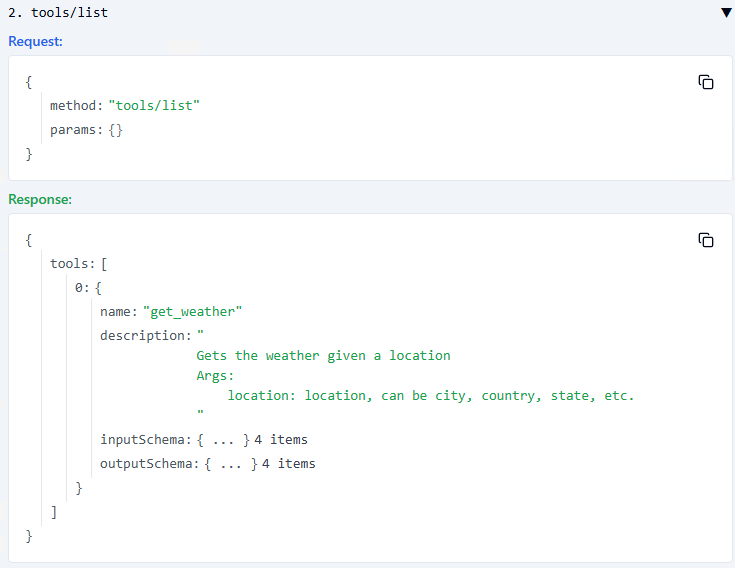
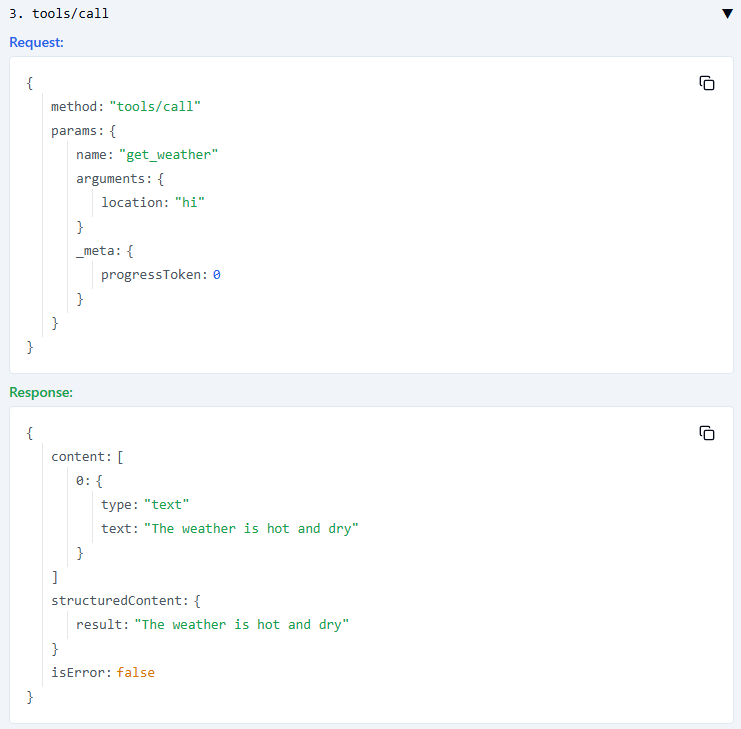
UPWARD: function called by client
Primitives
| 分类 | 描述 | 示例/用途 |
|---|---|---|
| Tools(99% case) | 由模型控制的逻辑/功能模块,可被调用执行操作 | API 请求、CRUD 操作、计算任务 IN: Parameters to be called; OUT: Connect with external services等 |
| Resources | 应用控制的数据资源,用于为主机或客户端提供上下文信息 | 文件内容、读取指令、用户数据等 |
| Prompts | 用户控制的提示模板,用于向 LLM 提供定制化提示 | 生成特定格式的研究报告、代码注释等 |
Tool/function as action called by LLM
A
- mcp server with tool defined <- @mcp.tool()
- string params
- custom input schema <- pydantic.BaseModel
from mcp.server.fastmcp import FastMCP
from pydantic import BaseModel, Field
from typing import List
# Create server
mcp = FastMCP("OtherInputs")
class Person(BaseModel):
first_name: str = Field(..., description="The person's first name")
last_name: str = Field(..., description="The person's last name")
years_of_experience: int = Field(..., description="Number of years of experience")
previous_addresses: List[str] = Field(default_factory=list, description="List of previous addresses")
@mcp.tool()
def add_person_to_member_database(person: Person) -> str:
"""
Logs the personal details of the given person to the database.
Args:
person (Person): An instance of the Person class containing the following personal details:
- first_name (str): The person's given name.
- last_name (str): The person's family name.
- years_of_experience (int): Number of years of experienceh.
- previous_addresses (List[str]): A list of the person's previous residential addresses.
Returns:
str: A confirmation message indicating that the data has been logged.
"""
with open("log.txt", "a", encoding="utf-8") as log_file:
log_file.write(f"First Name: {person.first_name}\n")
log_file.write(f"Last Name: {person.last_name}\n")
log_file.write(f"Years of Experience: {person.years_of_experience}\n")
log_file.write("Previous Addresses:\n")
for idx, address in enumerate(person.previous_addresses, 1):
log_file.write(f" {idx}. {address}\n")
log_file.write("\n")
return "Data has been logged"
if __name__ == "__main__":
mcp.run()
Prompts/Prompt Engineering
- provide the very end user a full prompt guide to use based on some keywords
A
- mcp server with prompt defined <- @mcp.prompt()
- cline不支持prompts
from mcp.server.fastmcp import FastMCP
mcp = FastMCP("Prompt")
@mcp.prompt()
def get_prompt(topic: str) -> str:
"""
Returns a prompt that will do a detailed analysis on a topic
Args:
topic: the topic to do research on
"""
return f"Do a detailed analysis on the following topic: {topic}"
@mcp.prompt()
def write_detailed_historical_report(topic: str, number_of_paragraphs: int) -> str:
"""
Writes a detailed historical report
Args:
topic: the topic to do research on
number_of_paragraphs: the number of paragraphs that the main body should be
"""
prompt = """
Create a concise research report on the history of {topic}.
The report should contain 3 sections: INTRODUCTION, MAIN, and CONCLUSION.
The MAIN section should be {number_of_paragraphs} paragraphs long.
Include a timeline of key events.
The conclusion should be in bullet points format.
"""
prompt = prompt.format(topic=topic, number_of_paragraphs=number_of_paragraphs)
return prompt
if __name__ == "__main__":
mcp.run()
Resources/RAG
- expose data to client or LLM as private data or context to answer questions
- like GET to retrieve data, while tools like POST to do action
A
- mcp server with resources define <- @mcp.resource(“inventory://overview”)
from mcp.server.fastmcp import FastMCP
mcp = FastMCP("Resources")
@mcp.resource("inventory://overview")
def get_inventory_overview() -> str:
"""
Returns overview of inventory
"""
# Sample inventory overview
overview = """
Inventory Overview:
- Coffee
- Tea
- Cookies
"""
return overview.strip()
inventory_id_to_price = {
"123": "6.99",
"456": "17.99",
"789": "84.99"
}
inventory_name_to_id = {
"Coffee": "123",
"Tea": "456",
"Cookies": "789"
}
@mcp.resource("inventory://{inventory_id}/price")
def get_inventory_price_from_inventory_id(inventory_id: str) -> str:
"""
Returns price from inventory id
"""
return inventory_id_to_price[inventory_id]
@mcp.resource("inventory://{inventory_name}/id")
def get_inventory_id_from_inventory_name(inventory_name: str) -> str:
"""
Returns id from inventory name
"""
return inventory_name_to_id[inventory_name]
if __name__ == "__main__":
mcp.run()
package & publishing
Public for local deployment if mcp server is in js
- upload to: https://www.npmjs.com/ at https://www.npmjs.com/package/@openbnb/mcp-server-airbnb
- donwload npm package manager: npx if mcp server is in python
- upload to: github
- download using python package manager: uvx
A
1.Adaption for publishing
# |_src/mcpserver
# |_ __init__.py
# |_ __main__.py - tell uvx how to run mcp server, use this file,
# |_ weather.py
# __main__.py
from mcpserver.weather import mcp
def main():
mcp.run()
# avoid first import execution
if __name__ == "__main__":
main()
# |_pyproject.toml - tell uvx what to build, how to trigger the run
# append to pyproject.toml
[project.scripts]
mcp-server = "mcpserver.__main__:main"
[build-system]
requires = ["setuptools"]
build-backend = "setuptools.build_meta"
[tool.setuptools]
package-dir = {"" = "src"}
[tool.setuptools.packages.find]
where = ["src"]
# README.md
{
"mcpServers": {
"weather": {
"disabled": false,
"timeout": 60,
"type": "stdio",
"command": "uvx",
"args": [
"--from",
"git+https://github.com/Hongyao-Tang/mcpserverexample",
"mcp-server"
]
}
}
}
uv run mcp-server
2.push to github leverage copilot agent mode
3.let other people download to local and run local
- download repo
- install deps according to toml
- run mcp-server defined in toml to run server
uvx --from git+https://github.com/Hongyao-Tang/mcpserverexample mcp-server
This cmd is configed to client
4.add to official
- official servers repo: https://github.com/modelcontextprotocol/servers
- make a PR to README in community servers adding link to your repo
Streamable HTTP

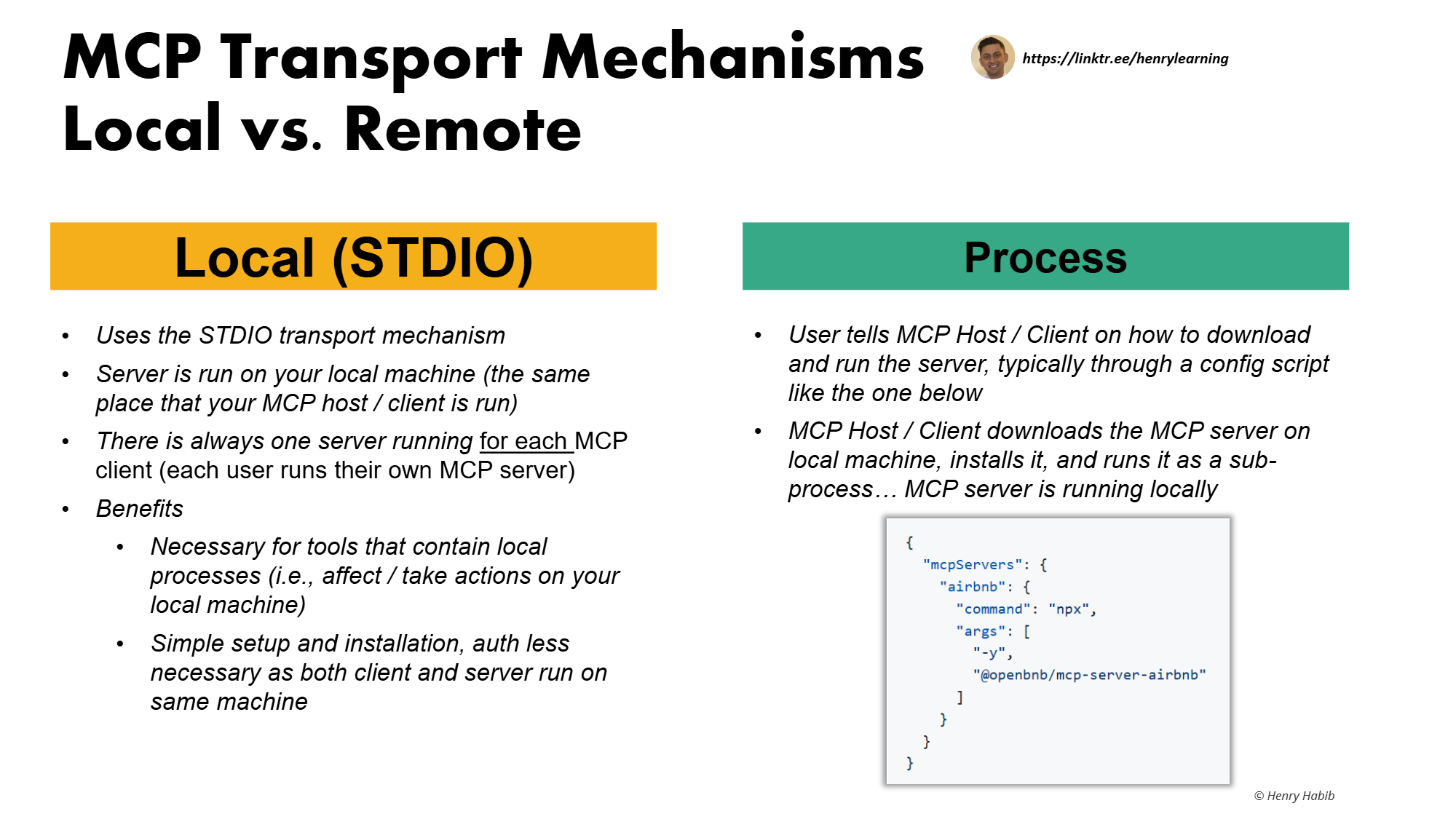
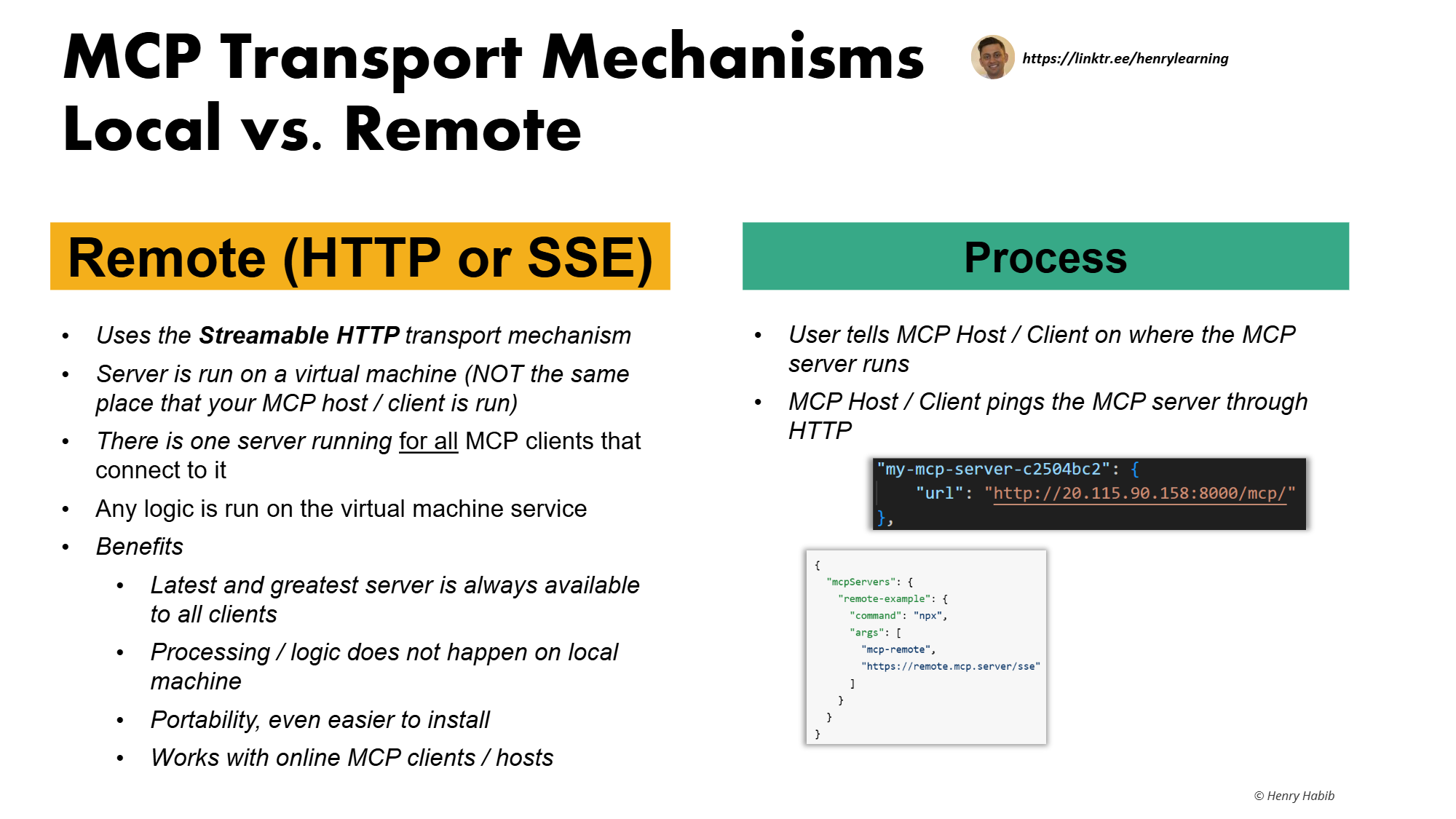
Why streamable HTTP S - LLM 生成文本输出时低延迟响应
- 用户可以更快看到“部分结果”,而> 不是等待完整响应
T - Streamable HTTP:边生成边发> 送
- 保持连接 HTTP 连接在响应过程> 中保持打开状态,直到数据流结束
- 流式传输(Streaming) 数据不> 是一次性发送完,而是分段> (chunked)发送,客户端可以边接收> 边处理
A GET /chat HTTP/1.1 Accept: text/event-stream
A
1.define a remote server
- look into source code at https://github.com/modelcontextprotocol/python-sdk/blob/main/src/mcp/server/fastmcp/server.py
# define a http server
def run(
self,
transport: Literal["stdio", "sse", "streamable-http"] = "stdio",
# change default setting by source code
host: str = "127.0.0.1"
port: int = 8000
FastMCP("name", host="2.2.2.2", port=8080)
- host默认就是127.0.0.1,是源码,视频里的比较早
- port不能定义在run,是源码,虽然有提示可能是错的
from mcp.server.fastmcp import FastMCP
mcp = FastMCP("server")
@mcp.tool()
def greeting(name: str) -> str:
"Send a greeting"
return f"Hi {name}"
if __name__ == "__main__":
mcp.run(transport="streamable-http")
2.serve a remote server
-
push to git
-
clone to vm with public ip
-
if mcp dev 必须要加文件 directly, it always start in local
-
so run server directly with uv run server.py
-
mcp dev server.py with http and url of http://0.0.0.0:8000/mcp/
3.consume a remote server
if client/cline do not support http, use mcp-remote from npmjs as WA
{
"mcpServers": {
"remote-example": {
"command": "npx",
"args": [
"mcp-remote",
"your url",
"--allow-http
]
}
}
}
npm -i mcp-remote
mcp install是local的做法,就是一个url
R
- adv: use local capabilities, no auth, no security concern
- disadv: run server locally means running client locally
MCP Client
Public choices
| Intergated Host + Client | Plugin Client |
|---|---|
| Claude on Desktop/windsurf ide/cursor/n8n/copilot studio as host+client | VSCode plugin CLine/windsurf as client VSCode as host |
| Feature | Cursor | Windsurf | Cline/Roo-Cline(Cline 的分支,功能增强版,如拖拽图片生成界面或代码) |
|---|---|---|---|
| What | 基于 VSCode 的完整 AI IDE | VSCode 插件 | 插件 |
| AI Models | GPT-4o, Claude 3.5 Sonnet, o1, cursor-small | Codeium (Cascade), GPT-4, Claude 3.5 Sonnet | Any via API (Claude, GPT, Gemini, Qwen) |
| Pricing | $20/mo (unlimited prompts, custom API) | $15/mo (credit-based), free tier available | Free (pay-as-you-go via API usage) |
| Customization | High (model selection, workflow tweaks) | Moderate (streamlined, less config) | Very high (full control, open source) |
| Ease of Use | Power-user focused, more features | Beginner-friendly, “it just works” feel | Requires setup, more manual |
| Best For | Advanced users, heavy coders | Beginners, those wanting simplicity | Tinkerers, privacy/cost-conscious |
| Agentic Features | Advanced agents, AI Terminal, Composer | Automated code updates; Cascade panel | Automation via Roo-Cline; manual agent |
| Offline/Local Models | No | No | Yes (with local LLMs) |
DOWNWARD: Call server with MCP protocol
client is to
- download server
- install server
- run server
- connect to server
- list tools
- call tool
T
Using Python SDK ClientSession class
A - Install server
Installation is recording cmd the start the server in client config.json, this is all we need to do.
- manualy edit config
C:\Users\user2\AppData\Roaming\Code\User\globalStorage\saoudrizwan.claude-dev\settings\cline_mcp_settings.json
{
"mcpServers": {
"weather": {
"disabled": false,
"timeout": 60,
"type": "stdio",
"command": "uv",
"args": [
"--directory",
"C:\Users\user2\Desktop\code\helloworld",
"run",
"weather.py"
],
"autoApprove": ["*"]
}
}
}
- auto generate run cmd and add it
# mcp is by claude, this will add to CLAUDE config.json at C:\Users\user2\AppData\Roaming\Claude\claude_desktop_config.json, need to copy to cline config.json
mcp install weather.py
A - Call server
- run server <- mcp.StdioServerParameters
- connect to server <- await session.initialize()
- list <- await session.list_tools()
- call tool,we can list them , we can call them <- await session.call_tool(“get_weather”, arguments={“location”: “SH”})
from mcp import ClientSession, StdioServerParameters, types
from mcp.client.stdio import stdio_client
import asyncio
import traceback
server_params = StdioServerParameters(
command="npx",
args=["-y", "@openbnb/mcp-server-airbnb", "--ignore-robots-txt"], # Optional command line arguments
)
async def run():
try:
print("Starting stdio_client...")
async with stdio_client(server_params) as (read, write):
print("Client connected, creating session...")
async with ClientSession(read, write) as session:
print("Initializing session...")
await session.initialize()
# TOOLS
print("Listing tools...")
tools = await session.list_tools()
print("Available tools:", tools)
# Hardcoded, LLM will determine which tool to call, and what arguments to pass
print("Calling tool...")
result = await session.call_tool("airbnb_search", arguments={"location": "California"})
print("Tool result:", result)
# RESOURCES
print("Listing resources...")
resources = await session.list_resources()
print("Available resources:", resources)
print("Listing resources templates...")
resources = await session.list_resource_templates()
print("Available resource templates:", resources)
print("Getting resource")
resource = await session.read_resource("weather://statement")
print(resource)
print("Getting resource template")
resource = await session.read_resource("weather://Vancouver/statement")
print(resource)
# PROMPTS
print("Listing prompts...")
prompts = await session.list_prompts()
print("Available prompts templates:", prompts)
print("Prompt tool...")
result = await session.get_prompt("get_prompt", arguments={"topic": "Water Cycle"})
print("Prompt result:", result)
except Exception as e:
print("An error occurred:")
traceback.print_exc()
if __name__ == "__main__":
asyncio.run(run())
uv run client.py
UPWARD: a function嵌入在上面的MCP Host中, called by LLM
- Client
- list tools
- LLM
- tool list with auto choice + [{‘role’: ‘user’, ‘content’: ‘Whats the weather in California?’}]
- analysis tool to call - [{‘role’: ‘user’, ‘content’: ‘Whats the weather in California?’}, ChatCompletionMessage(content=’’, refusal=None, role=’assistant’, annotations=None, audio=None, function_call=None, tool_calls=[ChatCompletionMessageToolCall(id=‘call_0_f1876815-d17e-423f-84d8-39d6e55c0eed’, function=Function(arguments=’{“location”:“California”}’, name=‘get_weather’), type=‘function’, index=0)])]
- Client:
- call tool - [{‘role’: ‘user’, ‘content’: ‘Whats the weather in California?’}, ChatCompletionMessage(content=’’, refusal=None, role=‘assistant’, annotations=None, audio=None, function_call=None, tool_calls=[ChatCompletionMessageToolCall(id=‘call_0_f1876815-d17e-423f-84d8-39d6e55c0eed’, function=Function(arguments=’{“location”:“California”}’, name=‘get_weather’), type=‘function’, index=0)]), {‘role’: ‘tool’, ’tool_call_id’: ‘call_0_f1876815-d17e-423f-84d8-39d6e55c0eed’, ‘content’: ‘The weather is hot and dry’}]
- LLM
- full msg - above
- Final msg - The weather in California is currently hot and dry. Stay hydrated and protect yourself from the sun!
A
from mcp import ClientSession, StdioServerParameters, types
from mcp.client.stdio import stdio_client
import asyncio
import traceback
import json
from openai import OpenAI
import os
from dotenv import load_dotenv
load_dotenv('.env')
assert os.getenv("OPENAI_API_KEY"), "OPENAI_API_KEY not found"
server_params = StdioServerParameters(
command="uv",
args=["run", "server.py"], # Optional command line arguments
)
async def run(query):
try:
print("Starting stdio_client...")
async with stdio_client(server_params) as (read, write):
print("Client connected, creating session...")
async with ClientSession(read, write) as session:
# Initialize server
print("Initializing session...")
await session.initialize()
# Get tools
print("Listing tools...")
tools_result = await session.list_tools()
print("Available tools:", tools_result)
openai_tools = [
{
"type": "function",
"function": {
"name": tool.name,
"description": tool.description,
"parameters": tool.inputSchema,
},
}
for tool in tools_result.tools
]
# Make OpenAI LLM call
messages = [
{"role": "user", "content": query}
]
# client = OpenAI()
client = OpenAI(base_url="https://api.deepseek.com")
response = client.chat.completions.create(
# model='gpt-4o',
model='deepseek-chat',
messages=messages,
tools=openai_tools,
tool_choice="auto",
)
# LLM can only analyze what tool to call
# LLM cannot call the tool, client call the tool
messages.append(response.choices[0].message)
# Handle any tool calls
if response.choices[0].message.tool_calls:
for tool_execution in response.choices[0].message.tool_calls:
# Execute tool call
result = await session.call_tool(
tool_execution.function.name,
arguments=json.loads(tool_execution.function.arguments),
)
# Add tool response to conversation
messages.append(
{
"role": "tool",
"tool_call_id": tool_execution.id,
"content": result.content[0].text,
}
)
else:
return response.choices[0].message.content
# Get final response from LLM
response = client.chat.completions.create(
# model='gpt-4o',
model='deepseek-chat',
messages=messages,
tools=openai_tools,
tool_choice="auto",
)
return response.choices[0].message.content
except Exception as e:
print("An error occurred:")
traceback.print_exc()
if __name__ == "__main__":
query = 'Whats the weather in California?' # breakpoint
asyncio.run(run(query))
💡任何模型的Python SDK都和OpenAI一样,只有URL参数不一样
- OpenAI换成perplexity,换成deepseek模型
- SDK都和OpenAI一样用OpenAI(),只有里面的base_url不一样,API key用环境变量os.getenv(“OPENAI_API_KEY”)
from openai import OpenAI client = OpenAI(base_url="https://api.perplexity.ai"/"https://api.deepseek.com") client.chat.completions.create()
💡断点 - 展示代码的每一行运行 > python interpreter to venv > python debugger to current file F5 - start debugger F11 - step into 当前行执行前variable的值
💡.env
- 不加空格
- 可加引号 PASSWORD=‘abc123!@#’ 如果.env不在”${workspaceFolder}/.env",debugger找不到.env To customize Run adn Debug create a launch.json file /root/.vscode/launch.json “envFile”: “${workspaceFolder}/helloworld/.env”
进一步,代码里的相对目录可能也会有这个问题 干脆把项目根目录设置到子目录里,这样debugger 第一步会cd到这里,.env, 相对目录都能找到 “cwd”: “${workspaceFolder}/helloworld”
MCP Host
- host contains sth
- MCP host is any app that contains an MCP client
INCLUDE: LLM
Model: deepseek:deepseek-chat
- Balance: top up to have balance to create API keys
- API Keys: sk-xxx
- API:“https://api.deepseek.com” or “https://api.perplexity.ai”
R
cline就是你的team member
- 告诉他要做什么
- 看看他的计划
- 就执行了
Issue
if __name__ == "__main__":
- 不设置,mcp dev 没有反应
--directory
- 不设置,找不到依赖包
"Screenshot Demo": {
"command": "C:\\Users\\user2\\.local\\bin\\uv.EXE",
"args": [
"run",
"--with",
"mcp[cli]",
"mcp",
"run",
"C:\\Users\\user2\\Desktop\\code\\serverdd\\screenshot.py",
]
}
- 指定了目录能在当前的venv
"Screenshot Demo": {
"command": "C:\\Users\\user2\\.local\\bin\\uv.EXE",
"args": [
"--directory",
"C:\\Users\\user2\\Desktop\\code\\serverdd",
"run",
"--with",
"mcp[cli]",
"mcp",
"run",
"screenshot.py"
]
}